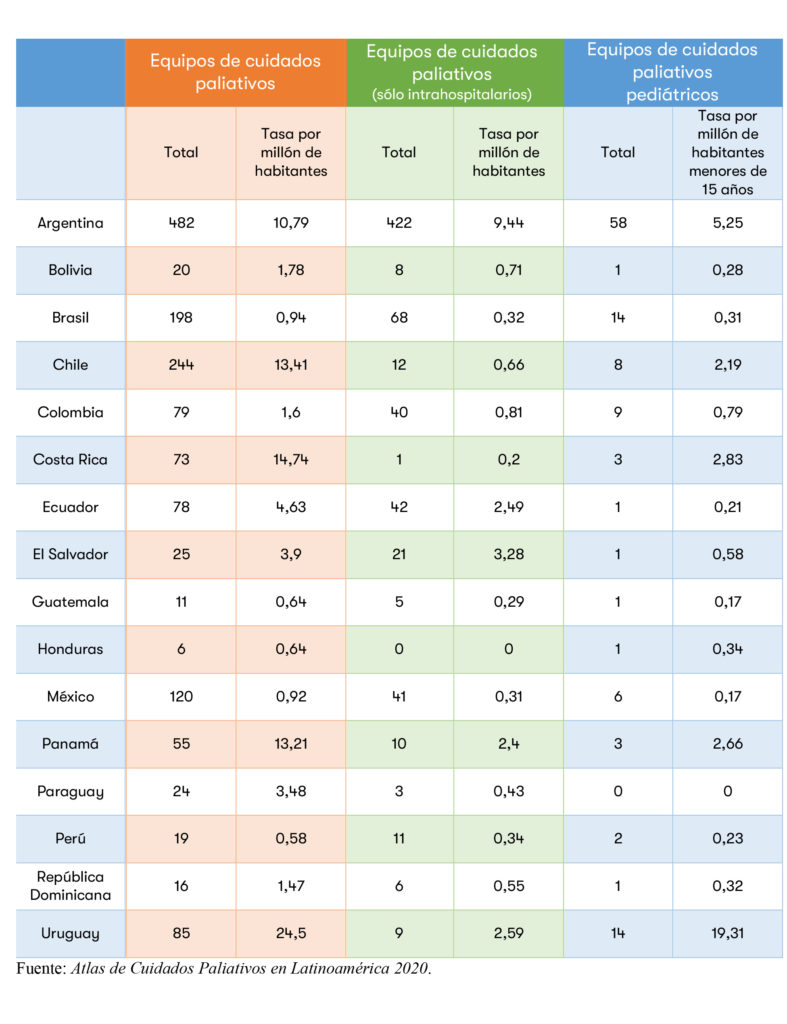At a time when Latin America is one of the places on the planet hardest hit by the Covid-19 virus, for example in countries such as Brazil, Chile, Colombia and Peru, it has been made public the Atlas of Palliative Care in Latin America 2020The report provides an overview of the state of this type of specialized care in the region. That is, care provided in a comprehensive manner to patients with severe suffering due to advanced disease.
The study provides information on 17 Spanish- and Portuguese-speaking Latin American countries, inhabited by more than 630 million people, and offers a systematic review of the development of this specialized care, with the aim of promoting it throughout the region. The countries that participated in the study are Argentina, Bolivia, Brazil, Chile, Colombia, Costa Rica, Dominican Republic, Ecuador, El Salvador, Guatemala, Honduras, Mexico, Panama, Paraguay, Peru, Uruguay and Venezuela.
Latin America has 1,562 palliative care teams, a ratio of 2.6 per million inhabitants. This is a rate that reflects progress in the number of services and in public policies in the region since 2013 in this area.
However, the improvement does not yet cover the needs of the population, as it is estimated that only 7.6 % of people in need of palliative care in Latin America receive it, although there are already five countries (Colombia, Costa Rica, Chile, Mexico and Peru) that have a palliative care law, which Spain, for example, does not have.
Uruguay, Costa Rica and Chile, ahead
The countries with the highest rate of palliative care teams per million inhabitants are Uruguay (24.5), Costa Rica (14.74) and Chile (13.41). At the bottom are Guatemala, Honduras (both with 0.64) and Peru in last place (0.58). Of these services, 1,173 are integrated into hospitals. Bolivia (0.89) and Ecuador (0.83) have the highest rate of these resources. In El Salvador and the Dominican Republic, none have been recorded.

As for pediatric palliative care, 123 teams have been detected, representing 7.9 % of the reported services. The countries with the highest rate per million population under 15 years of age are Uruguay (19.3) and Argentina (5.25). In Paraguay and Venezuela no teams have been identified.
These are some of the data included in the Atlas, developed by the Latin American Association for Palliative Care (cuidadospaliativos.org); the International Hospice and Palliative Care Association (hospicecare.com), and the Global Observatory of Palliative Care of the University of Navarra, who belongs to the Atlantes research group of the Culture and Society Institute (ICS) of the same university. The work is part of one of the research focuses of the 2025 strategy of the University of Navarra, "Palliative Medicine", within "Personalized Medicine".
Another indicator analyzed is the distribution of potent opium-derived drugs, the so-called opiates, for pain relief. Brazil (1,385 kg), Argentina (762.7 kg) and Colombia (556.1 kg) top the list. The nations in which there is the best collaboration between those who prescribe these analgesics and those who regulate their use are El Salvador and Uruguay. Brazil, Guatemala, Honduras, Paraguay and Venezuela have the worst collaboration, according to the Atlas.
Physician training
The training of physicians is another key factor in promoting the discipline, according to the Atlas. Eight countries recognize palliative medicine as a specialty and/or subspecialty: Argentina, Brazil, Colombia, Costa Rica, Ecuador, Mexico, Paraguay and Venezuela. Chile is in the process.
Likewise, the promotion of specific laws is a fundamental indicator for observing the development of the specialty. According to this study, Colombia, Costa Rica, Chile, Mexico and Peru currently have a palliative care law.
On the other hand, Mexico, El Salvador, Costa Rica, Panama, Venezuela, Ecuador, Brazil, Uruguay, Argentina and Chile have reported a national palliative care plan or strategy, some explicitly for cancer patients. However, their scope and whether they have an adequate budget for their implementation is unknown.
Care plans
The Lancet Commission on Global Access to Palliative Care and Pain Relief estimates that 3.5 million people in Latin America live each year with suffering from a serious illness. The World Health Organization (WHO) predicts that the global need for palliative care will continue to increase as a consequence of the growing burden of non-communicable diseases (cancer, cardiovascular pathologies...) and the aging process of the population.
DATO
3.500.000Every year, people in Latin America live with suffering due to a serious illness.
When asked about this figure, Miguel Sánchez Cárdenas, researcher at the Atlantes group, stated that "this value is an estimate. Although the Lancet Commission has estimated that more than 3.5 million people require palliative care, the number of people who receive it is a calculation based on the access they will have to services and drugs, so we recommend using it in proportion and not in absolute numbers".
Regarding what would be an adequate percentage of people receiving specialized palliative care, Sánchez Cárdenas points out that the rate "varies according to the type of disease. For example, in cancer it is considered that 90 % of patients require palliative care and should receive it. In other diseases such as cardiovascular diseases, 65%; in dementias, 80 %; in chronic lung diseases, 80 %. This implies that health systems have broad access for this population and tools to identify who needs palliative care."
Valuation
Miguel Sánchez Cárdenas considers that compared to 2013, when the first edition of the Atlas was published, "the data and ratios have improved. There has been an increase in the number of services, educational programs and the existence of public policies in the region. Although it is necessary to indicate that they are still considered insufficient to meet the need.".
Dr. Tania Pastrana, principal investigator of the project, said that "to promote the development of Palliative Care in Latin America it is necessary to know the current level of the discipline and its progress over time. We are very pleased to see that this edition shows important advances in all Latin American countries." "With the information in the Atlas it is possible to design plans and programs adapted to the needs and conditions of each country," said Dr. Patricia Bonilla, president of the Latin American Palliative Care Association.
Comparison
The availability of a legal framework for palliative care is considered important by many specialists in view of the attempts to legalize euthanasia in some countries, as has recently occurred in Spain, although there are some States, such as Colombia, that have regulated both phenomena: euthanasia and palliative care. As has been pointed out, in addition to Colombia, Costa Rica, Chile, Mexico and Peru already have palliative care laws.
Colombia is one of the few countries in the world that has decriminalized euthanasia, along with the Netherlands, Belgium, Luxembourg, Canada, and some states in Australia and the United States. In Colombia, euthanasia is considered a fundamental right, and is applied to those over six years of age with an incurable disease.
Europa
In terms of other indicators, as reported by this portal omnesmag.com, the EAPC Atlas of Palliative Care in Europe 2019 reported that Europe has 6,388 specialized palliative care services, of which 47 % are concentrated in four countries: Germany, the United Kingdom, France and Italy.
Of the total number of teams, 260 are located in Spain, which represents an average of 0.6 per 100,000 inhabitants, according to the European Association for Palliative Care (EAPC).. Atlas places Spain ranked 31st out of 51 European countries analyzed, at the same level as Georgia, Romania, Latvia or the Czech Republic.
The European Atlas was coordinated by Dr. Carlos Centeno, principal investigator of the ICS Atlantes Program and director of Palliative Medicine at the Clínica Universidad de Navarra. In a statement given to omnesmag.com, Dr. Centeno said: "Today euthanasia is demanded in society, even in law, for many things that have a solution. Medicine also has many things to say in the face of suffering that at times can be intolerable. Medicine has something, and I know it is effective, because I have seen it in action so many times".








